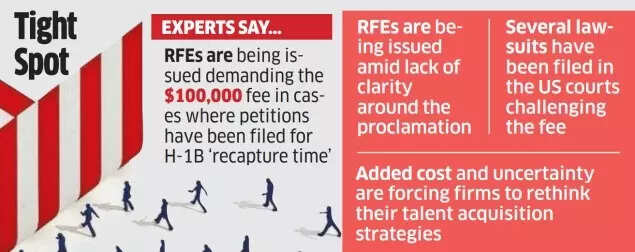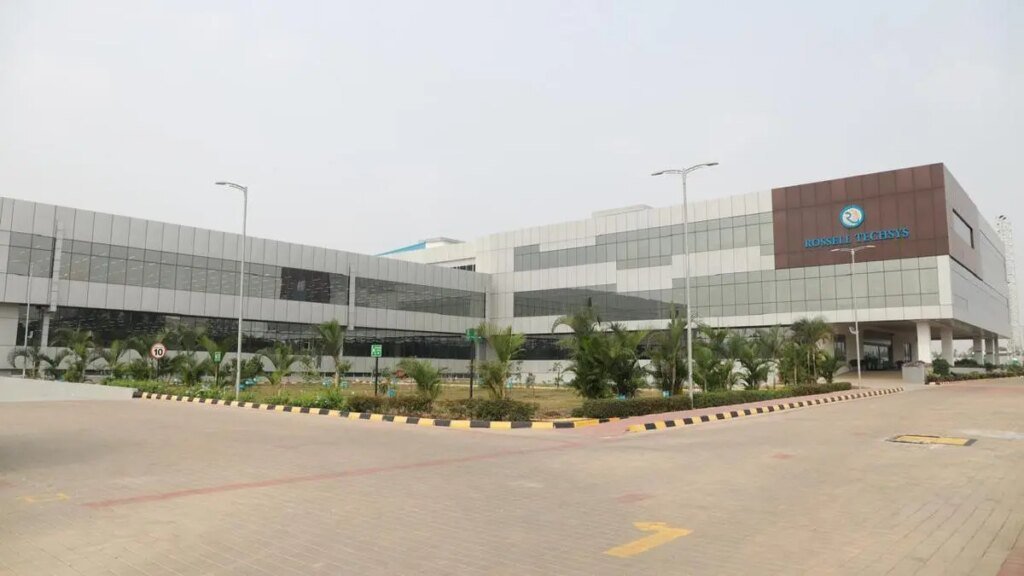Trump admin tightens noose! USCIS issues requests for evidence demanding $100,000 H-1B fee; here’s what it means for Indians
The Donald Trump administration is tightening its noose, cracking down and seeking evidence of the $100,000 H-1B visa fee. The United States Citizenship and Immigration Services has started sending requests for evidence seeking the $100,000 H-1B fee, amidst increased immigration oversight in the region.This action follows the executive order issued in September that established a $100,000 fee requirement for new H-1B applications submitted by candidates outside the United States and those needing consular processing after September 21.
When immigration officials determine insufficient documentation exists to approve an application, the USCIS issues a request for evidence.
H-1B visa fee hike: How US is asking for evidence
Several immigration specialists informed ET that requests for evidence are appearing in cases where the fee requirement is not applicable, citing ambiguity regarding who must pay the $100,000 fee. This situation could lead to additional legal challenges. This change predominantly affects Indians, who represent 70% of H-1B visa recipients.Gnanamookan Senthurjothi, who established The Visa Code, noted that requests for evidence demanding the $100,000 fee are being sent for H-1B “recapture time” applications.

H-1B visa noose tightens
The H-1B recapture time provision enables individuals to recover unused portions of their six-year limit in the United States by requesting the USCIS to include time spent outside the country for durations exceeding 24 hours.Request for Evidence (RFEs) continue to be distributed whilst ambiguity persists regarding the proclamation, notwithstanding USCIS’s explanatory notes.At the Murthy Law Firm in Maryland, managing attorney Adam Rosen identified a fundamental concern within the proclamation’s text. “The proclamation used the term ‘visa’ interchangeably with ‘status’ despite both holding separate meanings independent of one another,” he said.Additionally, Rosen addressed the validity of the fee requirement. Though section 212(f) of the Immigration and Nationality Act authorises presidential control over entry conditions, the proclamation requires payment from the petitioner rather than the entering beneficiary.Legal experts suggest a dual response strategy for RFE recipients. Initially, submit a response demonstrating fee exemption based on USCIS’s restricted interpretation of the proclamation. Subsequently, if denied due to non-payment, Rosen advises that the decision “can be challenged in federal court”, considering this the “optimal solution”.Various legal actions have been initiated in US courts, including submissions from the US Chamber of Commerce and H-1B representatives, contesting the fee implementation.Boundless Immigration’s CEO, Xiao Wang, suggests these applications were likely processed between initial qualification and USCIS’s October 20 formal guidance. “While this has created some confusion for employers who thought they understood the rules, right now it shouldn’t be taken as an indication that the administration intends to expand the definition of who must pay the $100k filing fee,” he said.Legal action, though available, remains challenging for many individuals. According to Kate Kalmykov, who co-chairs the immigration and compliance practice at Florida-based Greenberg Traurig law firm, “Filing a lawsuit is generally a measure of last resort. Litigation can be both time-consuming and costly.”The mounting expenses and unpredictable outcomes are influencing how organisations approach recruitment, as noted by Kalmykov. “At this time, some companies may choose to reassess their sponsorship strategies: either pausing new H-1B filings for overseas talent or relocating employees abroad to avoid the significant additional costs now associated with H-1B sponsorship under consular processing,” she said.Wang highlighted a notable transition towards independent immigration planning. “The H-1B’s volatility is driving both individuals and employers to explore pathways that don’t depend on lottery systems or sudden policy changes. Companies are also investing more in upskilling domestic workers while selectively using immigration for truly critical roles,” he said.



